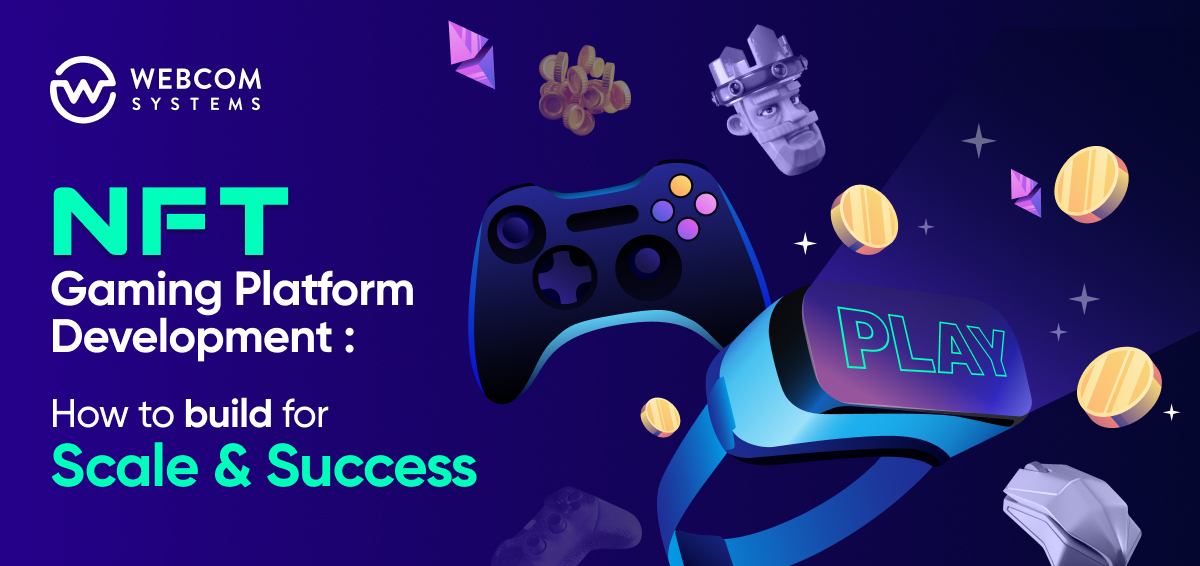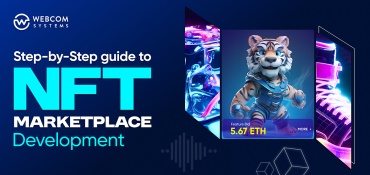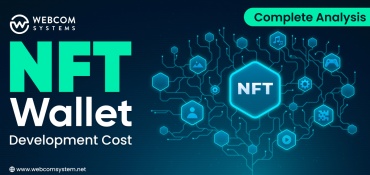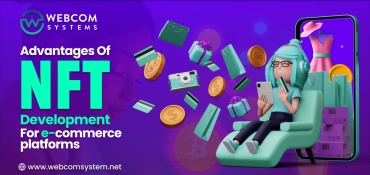Non-fungible tokens are creating a huge buzz in every sector of the digital economy, from art and music to fashion, real estate, and beyond. However, the rarity, utility, and economic worth of NFTs make NFT gaming platforms the most engaging and lucrative business model for gaming enterprises.
But, needless to say, building an NFT game requires a lot of technical expertise as well as considerable experience in actually turning a concept into a feature-rich gaming platform. If you are also looking to invest in NFT Gaming Platform Development, this article can guide you through the process. We have cited every single detail that you would require to build an NFT game that scales effectively and achieves success.
NFT Gaming Platform Explained
NFT gaming platforms are basically games that operate using non-fungible tokens. These NFTs signify in-game assets such as weapons, gaming characters, vehicles, skins, virtual land, tools, animals, power-ups, avatars, costumes, collectibles, and other unique digital items.
NFT in-game assets are different from regular in-game assets due to the fact that each one is unique and can’t be altered or duplicated, as they are stored on the distributed ledger of the blockchain framework. Furthermore, they give the gamer complete ownership rights and can be traded, bought, and sold for real money even outside of the gaming environment, as they hold real-world value.
Some of the most famous NFT gaming platforms include Axie Infinity, Splinterlands, The Sandbox, Illuvium, Gods Unchained, and many more. These NFT gaming platforms combine the enjoyment of gaming with the monetary return on investment of time and effort. Moreover, the whole platform is secure due to the transparent record-keeping and smart contract support.
Step-By-Step Process To Build An NFT Gaming Platform
Building an NFT gaming platform for your business requires a strategic approach as well as a detailed step-by-step process that must be followed precisely. Webcom Systems is a leading NFT gaming platform development company that builds strong gaming platforms for gaming companies by leveraging the power of non-fungible tokens. Take a look at our NFT game development process; you can follow these steps to create NFT gaming platforms for your business:
Concept Ideation and Brainstorming
You must begin by developing a game concept. For that, you need to have clarity over the category of your game and storyline. Define the plot, characters, setting, goal, obstacles, and everything from start to finish. Here are some of the categories you can choose from and create a storyline accordingly:
- NFT-based fantasy sports
- NFT-based racing games
- NFT-based adventure games
- NFT-based action games
- NFT-based PvP battle games
- NFT-based arcade games
- NFT-based board games
Though the most important part is to come up with the idea of how NFTs will be integrated into your game. You need to make your NFTs valuable or desirable as well, so that these items can be collected or traded. Otherwise, the platform would function similarly to any other game that users play on the internet.
Prototyping and Finalization
Once you’ve completed the initial phase, you’ll need to create an NFT game prototype with digital or paper mockups that incorporate all of your ideas. After discussing this with all the stakeholders, or team members, finalize the final draft with NFT details, storyline, game mechanics, and more.
Selecting A Blockchain Platform
From all the details finalized in the above steps, covering the game storyline, technical requirements, and complexity of smart contracts, choose the blockchain platform to build a scalable NFT game. You can pick any one from Ethereum, Flow, Binance Smart Chain, or else. This platform will serve as the foundation for your NFT game, so select one that supports fast transactions, low gas fees, maximum scalability, high security, and meets your project requirements.
Design the NFT Game and Its features
Now, a team of NFT designers should design the NFT game features and add the right functionalities. They should focus on planning how the NFTs will represent items, game characters, unique powers, or other elements. Additionally, determine what benefits these NFTs will offer, such as special features, abilities, or access to exclusive areas, all while providing them real-world value.
The gaming platform should have integrated features such as cross-chain compatibility, interoperability, standardization, liquidity, efficient storage, automated listings, push notifications, augmented reality (AR) and virtual reality (VR) integration, transparency, and reliable technical support.
Game Platform Development and NFT Integration
This is the part where actual developments start! You would need experienced NFT developers who would code smart contracts, develop assets, configure metadata, and integrate NFTs into the planned gameplay. They would provide you with a comprehensive list of technical specifications to compile, including blockchain integration, game engines (such as Unity or Unreal Engine), NFT mechanics, marketplace features, backend infrastructure, and server configuration.
Following that, the platform is built, covering all aspects of gameplay, UI, NFT functionality, and more. Smart contract development is carried out for NFTs to automate their implementation and keep track of transactions on the chosen blockchain platform. These NFTs are created by converting regular digital items into valuable, non-fungible tokens. After that, these NFTs are integrated into the platform to provide specific functionality.
Legalities and Security
During the development, all the legal regulations surrounding NFTs and blockchain technology are considered and incorporated into the NFT gaming platform. You can even consult with a legal team to ensure compliance with digital asset regulations, data privacy laws, and intellectual property rights.
Build the User Interface (UI)
Since the NFTs are managed and displayed on the NFT platform, the platform must have a simple and easy-to-understand layout. Your players should be able to use it from any device, including a computer, tablet, or phone, to buy, sell, and manage their NFTs with ease.
Testing and Quality Assurance
After completely designing and developing the platform, it is tested for NFT integration, game mechanics, and each and every element of gaming and NFT experience. Smart contracts and backend auditing are both very important aspects of this step, in which the practicality of smart contracts and the backend of the gaming framework are tested. If any issues are discovered, they are addressed as soon as possible in order to create a completely bug-free gaming platform, which is required to achieve the project’s goal.
Additionally, the game is beta tested among a small number of users to ensure its success in the live market.
Launch the Game And Post-Launch Support
After addressing any issues found during beta testing and making necessary adjustments, the NFT gaming platform is officially launched for public use. However, the journey to build an NFT gaming platform doesn’t end here! Your developed platform needs to be continually monitored for any bugs or system failures. Furthermore, it should be regularly updated with new features to ensure that the platform remains engaging as the market and trends shift.
Adopt Different Monetization Strategies
Now, in order to make your platform actually profitable, you need to employ one or more monetization models. These include direct NFT sales, in-game purchases, subscription plans, and advertising through brand partnerships, in-game ads, and more.
The most commonly used model is play-to-earn. It rewards players with game NFTs, ensuring their active participation and, thus, delivers gaming business success.
Marketing of NFT Gaming Platform
No matter how enjoyable and lucrative the gaming experience is that your platform offers, it won’t be a success if no one knows about it! To do this, you must market your NFT game on the channels where it is easier to locate your target audience. Social media sites such as Discord, Telegram YouTube, Instagram, Snapchat, and others are excellent choices for that. You can even reach out to gamer influencers, who can not only test your game during the beta testing phase but also spread a good word among their followers.
Final Words
It is undoubtedly profitable to invest in NFT gaming platforms, but only if they are properly built! It takes a great deal of research, technical resources, and expertise to create a successful NFT gaming platform that guarantees both success and scalability
What if you had experts by your side to help turn your ideas into a thriving NFT gaming platform? At Webcom Systems, we have been specializing in NFT game development for years! Our team combines expertise in game platform development, blockchain technology, smart contract programming, and other emerging technologies to create NFT-based games for both businesses and startups. Contact us to develop an NFT game for your next business venture!
Recommended Read: Cost to Develop NFT Game





